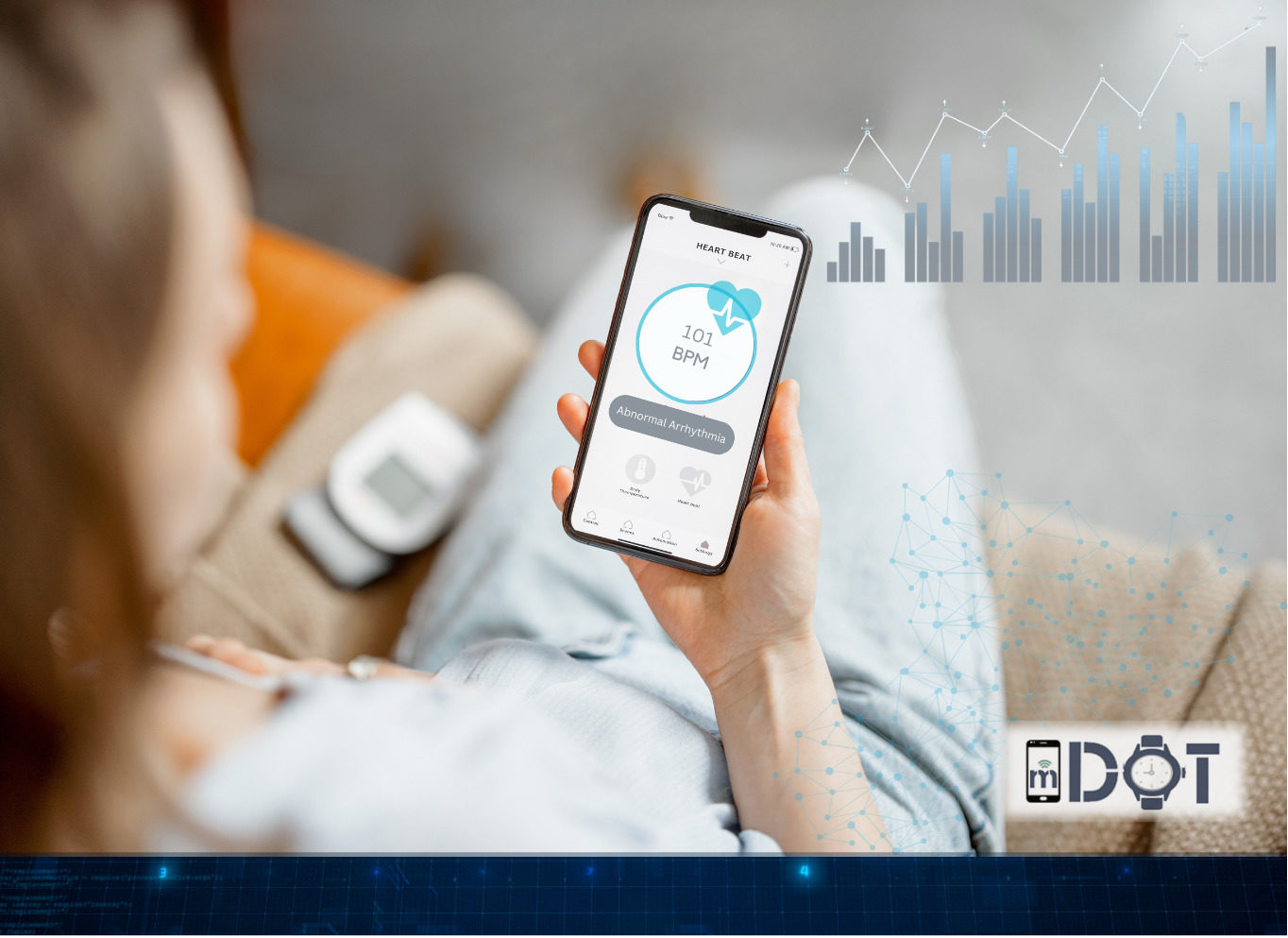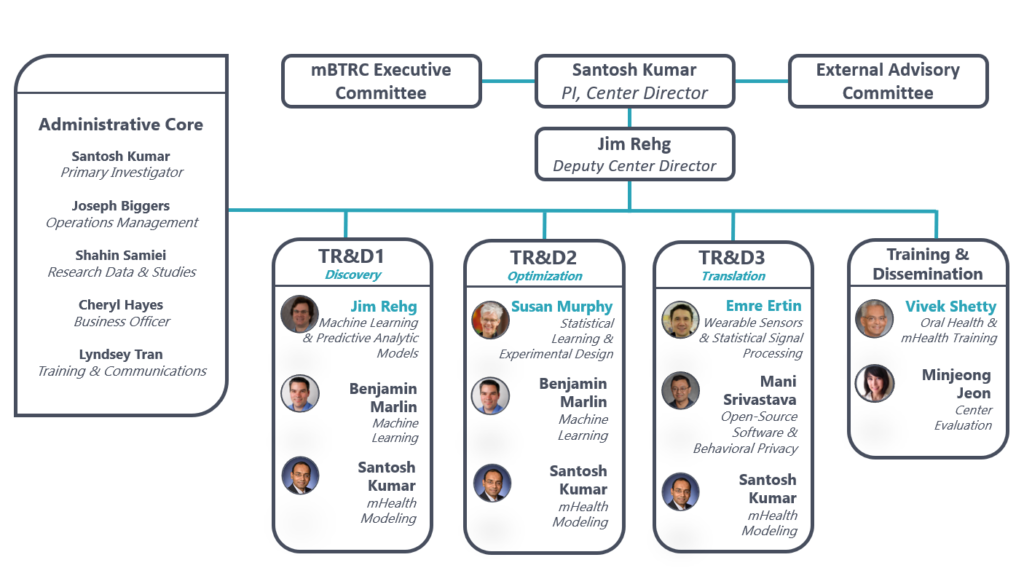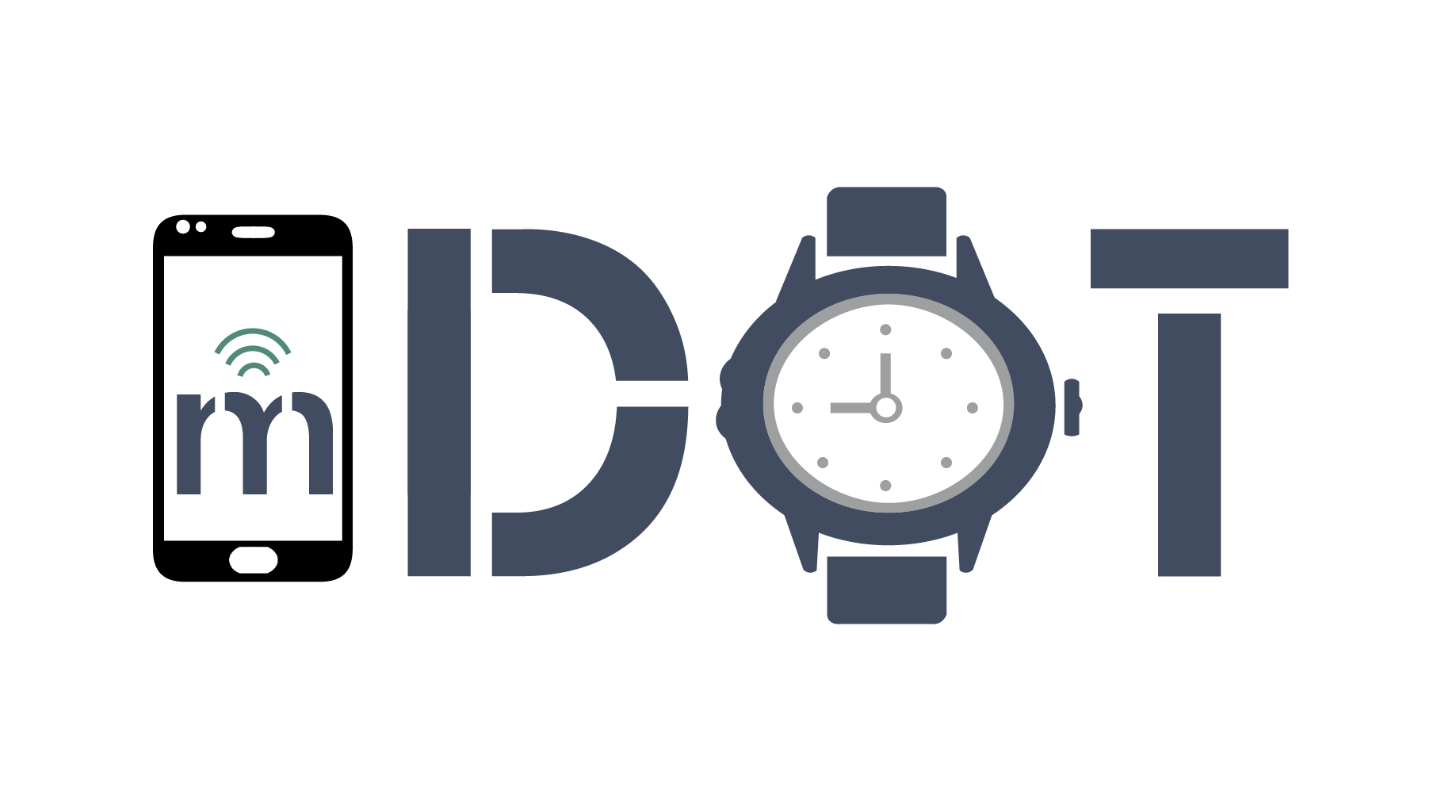We envision a powerful new paradigm

for maintaining health and managing the growing burden of chronic diseases, specifically, temporally-precise mHealth interventions that are optimized to the moment-to-moment biopsychosocial-environmental context of each individual to directly manage, treat, and prevent medical conditions. The long-term goal of this center is to establish a national technological resource for enabling optimal health care (and self-care) for each individual by leveraging noisy but ubiquitous measures of health, behaviors, surrounding contexts, and responses to treatments and interventions via mHealth biomarkers.
To illustrate our vision, consider a high-need patient, Sam, who has just been discharged from the hospital after treatment (fitted with a prosthetic heart valve) for a new onset of heart failure. Under a currently typical care scenario, Sam receives prescription medication and has one week and one month follow up visits scheduled. To prevent recurrence, he is recommended to reduce sedentary behavior, improve his diet, quit smoking, and brush twice daily to reduce his risk of heart valve infection. Sam is motivated and works on each of these recommendations initially. But, in the absence of any active ongoing support, he gradually falls back to his prehospitalization lifestyle and ends up in the hospital again with a second heart failure event.
It does not have to be that way. mDOT Center technologies enable fundamentally new behavioral intervention approaches to substantially increase the likelihood of success of maintaining a healthier lifestyle. The mDOT Center works with multiple collaborative projects to enable temporally-precise mHealth interventions that can be applied to patients like Sam. At the time of discharge, Sam can be provided with sensors that can provide regular measurements of cardiovascular states remotely. Sam’s clinicians can use these measures to adjust his medications accordingly, with confidence that missing data and uncertainty are robustly handled. Second, Sam can be provided with a temporally-precise physical activity intervention app (on his smartphone and wearable device) that gives him personalized recommendations on how to improve physical activity optimized to his current life circumstances and preferences. Third, Sam can be provided with a temporally-precise intervention to stay abstinent from smoking. Finally, Sam can be provided with personalized interventions to control overeating and to develop a habit of brushing and flossing twice daily.
None of these interventions will keep Sam out of the hospital if Sam does not maintain these new behaviors. mDOT Center technologies will initially assist Sam with navigating the challenges of multiple behavior change by coordinating among the suite of interventions that he has been provided with. mDOT Center technologies will keep Sam engaged for the long run by making sure that intervention apps behave sensibly in the absence of needed inputs when Sam forgets to charge or carry his personal devices; and by adapting intervention intensity as his commitment for each behavior ebbs and flows over time and his life circumstances evolve and change. Finally, mDOT Center technologies ensure that Sam doesn’t need to worry about risks to his privacy as a result of engaging with mHealth interventions. In summary, health behaviors are powerful drivers of health states, often with effects on par with or exceeding the effect of pharmaceuticals. The mDOT Center will harness sensors and machine learning to support patients like Sam to become engaged, effective, long-term partners in their own disease prevention and management.
Healthcare is the single largest sector of our

economy and the continuing health of our society is increasingly threatened by the enormous cost of providing healthcare, especially for chronic diseases. Many of these diseases are inextricably linked to mutable health behaviors such as poor diet, lack of physical activity, and smoking. The ballooning costs have reinvigorated the focus on potential economic benefits of prevention rather than the escalating costs of treatment. Emerging value-based care models increasingly promote engagement in self-care and help high-cost patients improve positive health behaviors (e.g., checking blood sugar regularly) and monitor those patients more proactively to prevent high-cost services (e.g., hospitalizations).
A key strategy for making self-care and preventive health behaviors more achievable has been the integration of passive monitoring into daily life via wearables and providing personalized information and guidance to patients. The number of wearables sold has been rapidly growing, set to treble in size in five years. The number of digital biomarkers has been commensurately increasing, as well. Additionally, there is rapid progress in the discovery and validation of mHealth biomarkers by researchers, making it possible to obtain a wide variety of digital biomarkers from the sensors already included in smartphones and wearables (e.g., smartwatches). But, the majority of these biomarkers have yet to be used to improve wellness or health outcomes.
Temporally precise mHealth interventions. mHealth biomarkers such as atrial fibrillation and fall detection (introduced in Apple Watch 4) have a clear intervention (i.e., referring to a care provider or calling emergency personnel). But, temporally-precise mHealth interventions targeted at behavior modification (e.g., recommending diet control), delivered at the most opportune moment so as to have the maximum long-term efficacy, require identifying ideal timing and content from multimodal time-series of noisy digital biomarkers that is personalized to both the individual and their current context. Further, to maintain the interest, engagement, and receptivity of the individual over time for behavior maintenance, the intervention must adapt over time to changing preferences, internal states, and external context of the individual. Modifiable behavioral and contextual risk factors are known to be the major determinant of most disease outcomes, and hence maximizing the efficacy of such mHealth interventions holds significant promise to improve health and disease outcomes in this new era.
The mDOT Center pursues multiple technological innovations to enable the discovery, design, optimization, and implementation of temporally-precise mHealth interventions that maintain user engagement and maximize longterm efficacy. First, to enable the discovery of innovative and actionable mHealth intervention targets and their timing triggers from imperfect multi-modal biomarker data streams, we develop methods and tools to model temporal dynamics of risks and their key drivers. Second, to optimize mHealth interventions so as to maximize their long-term therapeutic efficacy and engagement for each individual, the mDOT Center works to advance reinforcement learning methods so they can be applied to rapidly personalize intervention selection, adaptation and timing rules. Third, we develop co-optimized hardware-software architectures for next-generation, high data-rate sensors; a modular abstraction for biomarker computations; and a privacy management framework to support computation, data, and battery efficient implementation of temporally-precise mHealth interventions.
Maximizing the efficacy of such mHealth interventions through mDOT Center technologies can improve health and disease outcomes by enabling patients to initiate and sustain the healthy lifestyle choices necessary to prevent and/or successfully manage the growing burden of multiple chronic conditions.














 for maintaining health and managing the growing burden of chronic diseases, specifically, temporally-precise mHealth interventions that are optimized to the moment-to-moment biopsychosocial-environmental context of each individual to directly manage, treat, and prevent medical conditions. The long-term goal of this center is to establish a national technological resource for enabling optimal health care (and self-care) for each individual by leveraging noisy but ubiquitous measures of health, behaviors, surrounding contexts, and responses to treatments and interventions via mHealth biomarkers.
for maintaining health and managing the growing burden of chronic diseases, specifically, temporally-precise mHealth interventions that are optimized to the moment-to-moment biopsychosocial-environmental context of each individual to directly manage, treat, and prevent medical conditions. The long-term goal of this center is to establish a national technological resource for enabling optimal health care (and self-care) for each individual by leveraging noisy but ubiquitous measures of health, behaviors, surrounding contexts, and responses to treatments and interventions via mHealth biomarkers.
 economy and the continuing health of our society is increasingly threatened by the enormous cost of providing healthcare, especially for chronic diseases. Many of these diseases are inextricably linked to mutable health behaviors such as poor diet, lack of physical activity, and smoking. The ballooning costs have reinvigorated the focus on potential economic benefits of prevention rather than the escalating costs of treatment. Emerging value-based care models increasingly promote engagement in self-care and help high-cost patients improve positive health behaviors (e.g., checking blood sugar regularly) and monitor those patients more proactively to prevent high-cost services (e.g., hospitalizations).
economy and the continuing health of our society is increasingly threatened by the enormous cost of providing healthcare, especially for chronic diseases. Many of these diseases are inextricably linked to mutable health behaviors such as poor diet, lack of physical activity, and smoking. The ballooning costs have reinvigorated the focus on potential economic benefits of prevention rather than the escalating costs of treatment. Emerging value-based care models increasingly promote engagement in self-care and help high-cost patients improve positive health behaviors (e.g., checking blood sugar regularly) and monitor those patients more proactively to prevent high-cost services (e.g., hospitalizations).







